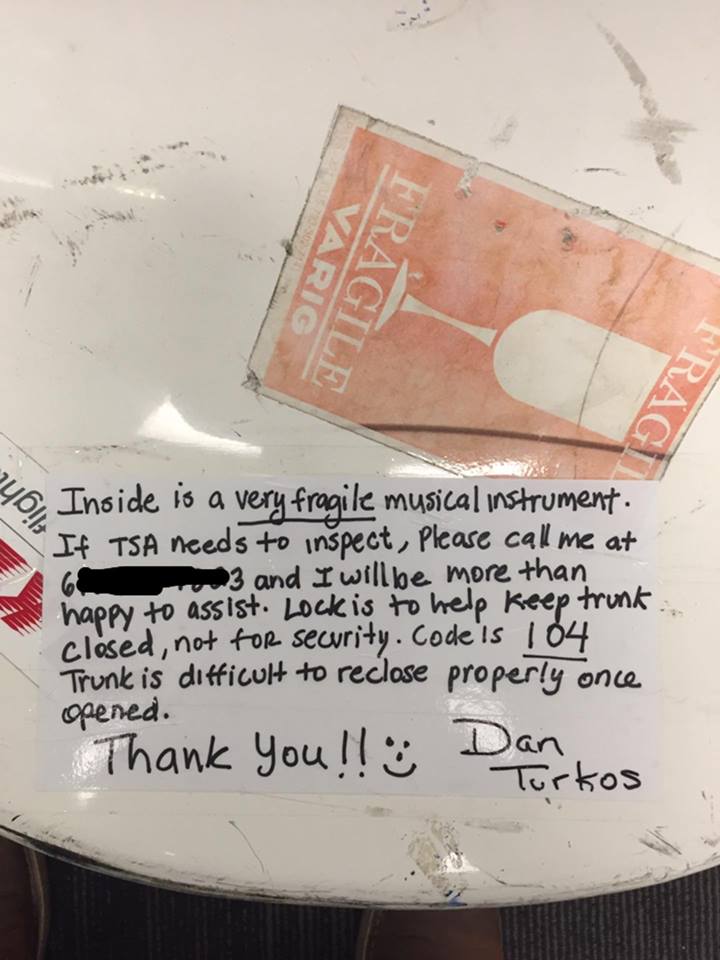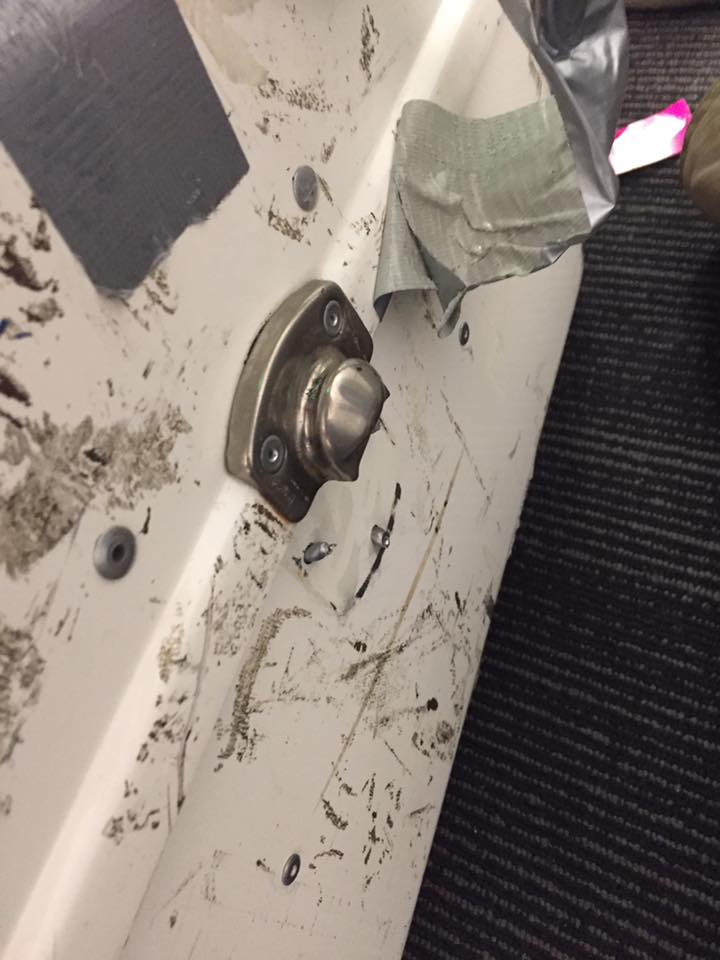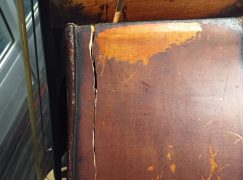Air rage: A doublebass is smashed by US baggage handlers
mainPost from Dan Turkos, a Philadelphia bassist:

I opened my flight case at San Francisco International Airport after flying Southwest Airlines to find that the neck had been broken on my double bass from circa 1870. This instrument is my love, affectionately named Penny, and my livelihood as a professional musician. The bass was inspected by TSA (Transportation Security Administration) and myself at Philadelphia International Airport as requested on my case.
I had a layover at McCarran International Airport in Las Vegas. Upon arrival at SFO, hinges were missing, a combination lock (with code available) was sheared off the side and the duct tape used for extra piece of mind was cut. Clearly the instrument was opened without me present, disregarding my request on the instrument case.

I don’t avidly post on Facebook, but my colleagues and I agree that this treatment of instruments is unacceptable. Spread the word so airline workers receive proper training to deal with such luggage or at the very least, read a note and value it’s content as to avoid these issues in the future.







Exactly the sort of treatment I mentioned, and specifically of contrabasses, in a SD comment just hours ago: https://slippedisc.com/2017/05/more-air-woe-british-airways-cracked-my-double-bass/
Sometimes I can’t avoid checking my guitars and I hate it.
Well, machines and conveyor belts don’t do special requests. One could put a thousand FRAGILE labels on the outside and have the ground crew enter everything into a computer, but the conveyor belts still wouldn’t know anything (nor could do anything special) about it.
Sad stories but true: I know many people in the shipping business. They have all seen customers shipping heavy, bulky, fragile stuff with newspaper wrapping. Sometimes, people use egg cartons or even unused diaper to wrap their precious goods. They thought putting fragile labels would do. Guess what happened to those shipments?
Shameful damages, but I would kinda disagree to blame on the airlines solely as if they target instruments recklessly by human. Chances are, humans are not involved in the damages.
In the good old days, such instruments could have been gate checked (which would be handled by human hands into a special cargo bay). Thanks to the terrorists and corporate greed (i.e., make you check in everything possible to charge additional baggage fee), airport security would typically stop such oversized items cold at the X-ray machines, eliminating possibility of a gate check.
Get a real flight case – that’s the only way.
That is a real flight case. It looks to me as though TSA knocked the hinges off because they couldn’t figure out how to open it. I’ve seen them do the same to other contrabass and cello (flight) cases.
“Chances are humans are not involved in the damages”
It’s humans who design the machines and processes for handling luggage. It’s humans who run the airlines who basically don’t give a toss.
My double bass flight case uses several bungee cords over hooks to secure the top. These are more durable and actually easier to open and close than the latches in most instances. It is a very intuitive system, and how the case should be opened is immediately obvious at first glance. Yet I have still have had TSA agents go through the tedious effort of untying every single bungee or simply cutting every cord and re-securing it by wrapping the entire case in packing tape. This is after the initial inspection, for which I insist to be present (and they are most often very accommodating). The baggage handlers usually view the extra effort of dealing with these oversize cases with tremendous disdain, and sometimes will take out these frustrations on the instrument… going far beyond apathy towards its fragile nature. An acquaintance one received the case back with a note from a handler stating that something cannot be both overweight AND fragile. It doesn’t need to be like this… I have generously tipped (essentially bribed) individuals to take just the least bit of care with it, but in my anecdotal experience I have found that it ends up being treated worse somehow…
Guys and gals: I’ve been at this for 30+ years, do not place a valuable instrument of any kind in baggage. As a rule of thumb, it will be destroyed. Make other arrangements if you are a bassist or anyone who plays a large instrument.
Believe me, we try to avoid it as much as possible. These instruments are well protected and won’t be damaged unless mishandled. There are instances where borrowing an instrument is simply not an option.. and do you believe that shipping it would be safer? I don’t know the details of this instance but you don’t seem to understand the necessities of an international performing career. Edgar Meyer can buy a seat for his because it’s a tiny solo-sized instrument, but that’s not an option for most of us. I don’t think it is too much to ask that professional baggage handlers actually go about their job professionally. There are certain countries (not many) where this culture does not exist and instruments are treated with care, so this is not some unrealistic utopia.
What “other arrangements?” Never perform anywhere that isn’t within driving distance? Play on a borrowed, unfamiliar instrument for an audition or engagement requiring a plane trip? Touring musicians have to travel for their livelihoods, and a bassist has no choice but to check his or her instrument for a flight; there is no amount of money that will get them into the cabin.
Really disappointed to see that Southwest has joined the ranks of the offenders; they’d had a reasonably good reputation before.
Walt and Ben don’t get it. Some musicians have to fly and some valuable, fragile instruments have to be checked. Instead of blaming the victims, airlines should be pressured to identify and protect musical instruments. Turkos took every reasonable precaution and still lost out.
By the way, Bratschegirl, I’ll put my money on TSA, not Southwest, employees as the wrongdoers.
I’m sorry, I should have said “your instrument and shipping trunk will be destroyed.”
It’s a very sorry situation, remember- these, er, “people” can barely transport human beings without damaging them one way or another. A rental arrangement would be a solution, not without cost and understandably not ideal.
The airlines suck. Good luck.
Rental of what? A private jet?
i doubt human agency in the terrible damage wrought to the instrument, but am suspicious of TSA agency in the initial breach of the instrument case. That said, the item WAS checked in with Southwest, and they have at least a moral responsibility for what happened. I think they are one of the more ethical airlines out there, and I fully expect them to step up and at least pay for restoration. Shame on them if they don’t…
In these days of terrorist attacks, drug smuggling and goodness knows what else, we really have no option but accept that what worked for large instruments in the “old” days does not work now. Gary Karr toured Koussevitsky’s bass all over the world with great frequency and I do not think anything ever happened to the instrument. That instrument’s case was extremely solid, though, and I can only assume that promoters picked up the tab for extra baggage costs.
I also doubt that he ever had to open the instrument case after it had been checked in, whereas nowadays even after x-rays and an in-person inspection, somewhere in the bowels of an airport it is clear that someone may decide, arbitrarily or not, that a second/third look is required irrespective of damage done to a case to get into it and further damage to the instrument. More than that, though, it is clear in the two cases recently reported in this blog that the damage was probably caused when the musician transferred between flights and that it was the baggage handlers at the intermediate airport who are to blame.
Surely this is where the airlines, Musicians’ Unions and other representative bodies should be able to find some common ground. It is routine nowadays for passengers from many countries on flights ending in the USA to have special inspections requiring opening of all hold luggage prior to its being accepted for travel. Presumably there is then some sticker affixed or other method of confirming to baggage handlers that this has been done and that no further inspection is necessary. Am I being totally naive to think that a similar agreement covering instruments could be negotiated? Of course it will take time and more than a little diplomacy. But if it has not been tried, is it not worth having “a go”? If not, then the only recourse I can see, time-consuming and expensive as it will be, is for owners of large instruments either to fly non-stop from one destination to another, or to purchase separate tickets for each flight and re-check-in each time. Sure, a pain in the neck and elsewhere. But what is better? The cost of doing without the instrument whilst often very expensive repairs are effected? Or more expensive travel? I know what I’d opt for.
I believe I read about Gary Karr watching as the neck of his bass was snapped off on a conveyor belt at an airport. Perhaps this was a different bass than the one you referred to. My son has an extremely sturdy sarcophagus type case and has shipped it via FedEx with no issues so far. It still would give me the willies though every time we bid goodbye to his baby…